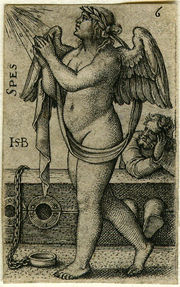Hope

Hope is a belief in a positive outcome related to events and circumstances in one's life.[1]
In a religious context, it is not considered as a physical emotion but as a spiritual grace. Hope is distinct from positive thinking, which refers to a therapeutic or systematic process used in psychology for reversing pessimism. The term false hope refers to a hope based entirely around a fantasy or an extremely unlikely outcome.
Contents |
History
Hope was personified in Greek mythology as Elpis. According to Hesiod's Works and Days, when Pandora opened Pandora's Box, she let out all the evil of the world, and only hope remained:
- Formerly the tribes of men on earth lived remote from ills, without harsh toil and grievous sicknesses that are deadly to men. But the woman unstopped the jar and let it all out, and brought grim cares upon mankind. Only Hope remained there inside her secure dwelling, under the lid of the jar, and did not fly out, because the woman put the lid back in time by the providence of Zeus the cloud-gatherer who bears the aegis.
In Human, All Too Human, philosopher Friedrich Nietzsche argued that "Zeus did not want man to throw his life away, no matter how much the other evils might torment him, but rather to go on letting himself be tormented anew. To that end, he gives man hope. In truth, it is the most evil of evils because it prolongs man's torment." Emily Dickinson wrote in a poem that "'Hope' is the thing with feathers-- / That perches in the soul--." Ernst Bloch in "Principle of Hope" (1986) traces the human journey for a wide range of utopias. Bloch locates utopian projects not only in the social and political realms of the well-known utopian theorists (Marx, Hegel, Lenin) but also in a multiplicity of technical, architectural, geographical utopias, and in multiple works of art (opera, literature, music, dance, film). For Bloch hope permeates everyday life and it is present in countless aspects of popular culture phenomenon such as jokes, fairy tales, fashion or images of death. In his view Hope remains in the present as an open setting of latency and tendencies.
Martin Seligman in his book Learned Optimisms (1990) strongly criticizes the role of Catholic churches in the promotion of the idea that the individual has little chance or hope of affecting his or her life. He acknowledges that the social and cultural conditions, such as serfdom and the caste system weighed heavily against the freedom of folks to change the social circumstances of their lives. In his book What You Can Change and What You Can't, he is careful to outline the extent that people can hold out hope for personal action to change some of the things that affect their lives.
In psychology, hope is normally considered to involve two components; (1) agency, involving the expectancy of positive outcomes, and (2) pathways, involving the ability to see how those positive outcomes can be reached.[2] Hope is important to both well-being and educational performance; people low in hope are more likely to be anxious and depressed,[2] and a recent longitudinal study showed that college students who were low in hope in their first year attained worse degree results three years later, even after controlling for intelligence, other personality traits, and previous performance.[3]
Images
 Seal of Rhode Island features an anchor below the word "HOPE," the state motto. It is taken from a Biblical passage in Hebrews 6:191 |
1:Which hope we have as an anchor of the soul, both sure and stedfast, and which entereth into that within the veil; The King James Version
See also
- Chance
- Disappointment
- Fear
- Optimism
- Risk
- Unrequited love
- Statue of Hope
References
- ↑ hope. (n.d.). The American Heritage Dictionary of the English Language, Fourth Edition. Retrieved March 18, 2008, from Dictionary.com.
- ↑ 2.0 2.1 Geraghty, A. W. A., Wood, A. M., & Hyland, M. E. (2010). Dissociating the facets of hope: Agency and pathways predict dropout from unguided self-help therapy in opposite directions. Journal of Research in Personality, 44, 155-158.
- ↑ Day, L., Hanson, K., Maltby, J., Proctor, C. L., & Wood, A. M. (in press). Hope uniquely predicts objective academic achievement above intelligence, personality, and previous academic achievement. Journal of Research in Personality.
|
|||||